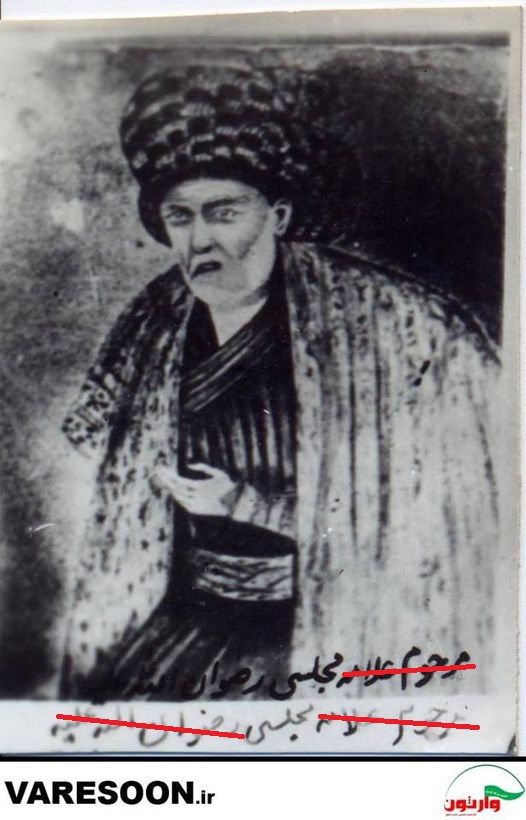 The 16th-century fervently anti-Sunni Iranian Safavid palace and court ‘scholar’, the ‘Shaykh al-Islam’ of Shiism, Majlisi II, not only attacked the Quran by denying its integrity and absolved the Jews of any involvement in the murder of the Prophet (), not only advocated kufr upon kufr in his magnum opus ‘Bihar al-Anwar’ (Bihar al-Dhulamat wal-Khurafat) and other works but also passionately sanctified the Majoosi eid of Nowruz, aligning himself with the ‘Ayatollahs’ in Iran and even Iraq in our time.
The 16th-century fervently anti-Sunni Iranian Safavid palace and court ‘scholar’, the ‘Shaykh al-Islam’ of Shiism, Majlisi II, not only attacked the Quran by denying its integrity and absolved the Jews of any involvement in the murder of the Prophet (), not only advocated kufr upon kufr in his magnum opus ‘Bihar al-Anwar’ (Bihar al-Dhulamat wal-Khurafat) and other works but also passionately sanctified the Majoosi eid of Nowruz, aligning himself with the ‘Ayatollahs’ in Iran and even Iraq in our time.
Tag Archives: Dajjalism
Majlisi and the Veneration of the Zoroastrian Persian Solar Calendar
Idol-Breaking in Sunni Persia
Abdolkarim Soroush’s Futile Attempt at Diluting Islam
Absurdity of Imamism: Birthday Party for ‘Mahdi’!
Neither Sunnis nor any other Shia sect, aside from the Twelver sect, believe that an alleged Mahdi was born over a millennium ago. Zaydis, just like Sunnis, affirm that Hasan al-Askari, the alleged father of the ‘Mahdi,’ had no children whatsoever as he was infertile! The Twelvers disagree and have created an entire cult (‘Mahdaviyat’) and occult around the so-called occultation (Ghaybat) of their ‘Mahdi’. They claim, based on flimsy reports even according to their own science of hadith standards, that the 15th of the sixth Islamic month of Sha’ban is the birthday of the Twelfth and last Shia Imam.
Continue reading Absurdity of Imamism: Birthday Party for ‘Mahdi’!
Khums – In Light of the Quran and the Sunnah by two Ex-Shias
𝙁𝙧𝙤𝙢 𝙩𝙝𝙚 𝘽𝙖𝙩𝙝𝙞𝙣𝙜 𝘾𝙖𝙧𝙩 𝘿𝙞𝙧𝙚𝙘𝙩𝙡𝙮 𝙞𝙣𝙩𝙤 𝙩𝙝𝙚 𝙎𝙚𝙖: 𝙃𝙤𝙬 𝙂𝙚𝙧𝙢𝙖𝙣𝙨 𝙊𝙣𝙘𝙚 𝙐𝙥𝙝𝙚𝙡𝙙 𝙈𝙤𝙙𝙚𝙨𝙩𝙮
Continue reading 𝙁𝙧𝙤𝙢 𝙩𝙝𝙚 𝘽𝙖𝙩𝙝𝙞𝙣𝙜 𝘾𝙖𝙧𝙩 𝘿𝙞𝙧𝙚𝙘𝙩𝙡𝙮 𝙞𝙣𝙩𝙤 𝙩𝙝𝙚 𝙎𝙚𝙖: 𝙃𝙤𝙬 𝙂𝙚𝙧𝙢𝙖𝙣𝙨 𝙊𝙣𝙘𝙚 𝙐𝙥𝙝𝙚𝙡𝙙 𝙈𝙤𝙙𝙚𝙨𝙩𝙮
Green Shawl-Clad Bastards – 70,000 Shia of Dajjal from Isfahan in Iran
In the name of Allah, and may His peace and blessings be upon His Final Messenger, Muhammad, the Truthful and trustworthy son of Abdullah, Al-Mustafa, who warned his Ummah about the tribulation of the one-eyed Dajjal and its connection to the lands of Persia (Iran).

Continue reading Green Shawl-Clad Bastards – 70,000 Shia of Dajjal from Isfahan in Iran






